Crux is Specialized's premium gravel bike that comes with a lot of characteristics borrowed from both its cyclo-cross history and featherweight Aethos road bike. The lightweight carbon frame offers excellent comfort on gravel surfaces but, with this specific model, the rest of the bike spec is not up to the same level as the frame.
- Best gravel bikes under £1,500 in 2023 - drop-bar machines that won't break the bank
- Gravel bike vs mountain bike: what are the differences?
- Gravel racing - what's next for cycling's fastest growing discipline?
Specialized Crux Comp gravel bike - Technical details
The inspiration for the Crux frame comes from Specialized Aethos, the featherweight bike that Spesh launched a couple of years ago. Unlike the Aethos, the Crux has been part of Specialized’s range for a good few years - but it was always more cyclo-cross than gravel orientated - this, of course, changed in 2021, and the new model can now be used across disciplines.
The frame is made with Specialized's 10R carbon, which is a notch down from the top S-Works level and has a claimed weight of 825g. The frame can accommodate tyres up to 47mm wide in 700c size, or 2.1in if using smaller 650b wheels. The frame is paired with a carbon fork.
This Crux Comp comes specced with a SRAM Rival 1 hydraulic disc groupset, DT Swiss G540 Disc wheels, and 2Bliss Ready 38mm Specialized Pathfinder Pro tyres.
The bike can be built with either 2x or 1x configuration, and the Comp comes with a 40T chainring at the front paired with an 11-42T Sunrace cassette at the back. Shifting on this bike is mechanical and solely handled by the right-hand paddle that has a 'double tap' function.
The finishing kit comes all from Specialized: you get a Roval Terra carbon seatpost, Specialized Power Saddle and Specialized Adventure Gear handlebar. For the size 49 frame, the bars are 380mm wide with 70mm reach and 12-degree flare, making the drops a touch wider than the hoods.
In terms of geometry, the Crux is a blend of cyclo-cross and gravel bikes and is definitely more aggressive and reactive in terms of handling than Specialized's more adventure-orientated and suspension-infused Diverge.
In the smallest 49 size, the Crux is not quite as long and slack as the more chunk-capable gravel bikes with its 70.5-degree head angle and 75.5-degree seat angle. The bottom bracket drop for size 49 is 74mm, and the wheelbase is 1,008mm.
My test 49 test bike is the smallest of the six sizes ranging up to 61.
Specialized doesn't list a weight for the full build, but on my scales, the size 49 test bike equipped with pedals and bottle cages weighed 9.1kg.
Specialized Crux Comp gravel bike - Performance
Specialized Crux has created a buzz in the gravel cycling scene since its launch and, after riding this bike, I'd say I agree with the sentiments. With the road-orientated Aethos being the inspiration for the Crux's design, it is one of those bikes I expected to perform well - and it easily met those expectations. Despite rolling on rather budget-orientated wheels, and a mechanical groupset, the frame is what made this bike a joy to ride.
As with any bike, sometimes it's the looks that spark your liking for the bike, and that was the case with the Crux. To me, the aesthetics were immediately pleasing with the classic frame shape and glossy paint job. The lack of dropped seat stays or anything else that would set this bike apart from being ‘just another bike’ is something I appreciate especially on a small bike.
Beyond its looks, the Crux frame sets it apart from its competitors. The frame is made with Specialized’s 10R carbon - that’s the top end of the brand's offerings if you exclude the 100g lighter 12R used for S-Works models (which, let's admit, are beyond most people’s budget). In the case of my test bike, the carbon has been finished with a glossy baby-blue paint job, which is the right amount of pop but nothing too obtrusive - and this is the case with the other colour options, as well.
Having ridden quite a few carbon-framed bikes - and written about the special ways carbon is laid up to make the frame “compliant yet stiff at the right places” - I admit I’ve become quite a sceptic of these buzzwords being nothing more but marketing nonsense. Yet, the Crux really delivered something unique.
The overall ride feel of the Crux is something between a true gravel grinder and a nimble cyclo-cross bike. It has a lively and nippy character and, from looking at the frame, you can tell this is not an adventure gravel bike. The frame lacks mounts - in fact, you only get the bare minimum of eyelets for carrying two bottles. It’s not really a downside, though, as I think this bike is best suited for gravel racing rather than multiday bikepacking trips anyway.
In fact, after riding a few hundred miles on the bike over both tarmac and gravel roads, the Crux made me convinced of its capability on both surfaces. With the clearance for wide gravel tyres, the bike is well suited for a variety of terrains and not limited to fast and wide roads. The clearance also allows for choosing between a 1x or 2x drivetrain setup, which makes this bike a tempting option for those who are thinking of investing in a high-performing do-it-all bike.
Specialized has targeted this bike for performance riding rather than being your weekend warrior on bikepacking trips and this is felt in the geometry of the bike. The bike excels on cyclo-cross-like fast gravel; it navigates rough singletrack paths and tight corners with buttery smoothness and is easy to bash up sharp climbs. The frame is very reactive and once you want to push, the bike responds and feels stiff enough to sprint as well.
The wheelbase of the bike (1,008 mm for size 49) is relatively short, and both the seat and head angles are rather steep. The Crux's reach-to-stack ratio makes the bike lower and longer than for example the brand's suspension-equipped Diverge or the similar-size Ribble Gravel SL Pro gravel bike.
This paired with the shorter wheelbase could make the bike feel rather twitchy but, to counteract it all, Specialized has dropped the bottom bracket to 74mm and the 50mm fork offset certainly helps to give the bike a calmer ride feel. The geometry is actually quite similar to that of Factor Ostro Gravel, which is a premium gravel race bike - and also one that could perform well on the roads too but not quite as stretched and low as on the BMC Kaius.
Moving on to the tyres, the Pathfinders add to that speed-focused target market of this bike with their low-profile tread pattern. The stock tyres are relatively narrow at 38mm and during the testing, I rode them with tubes in, which limited me slightly in terms of running very low pressure. I still feel I got a good feeling for them and I will say that they are not the ones I would choose myself. The reason I'd choose something else is that the Pathfinders only excel on very smooth and hardpacked gravel and once they hit anything wet, it’s a very slippy-slide situation. Where I live in Scotland, beyond summer, you’re lucky to have two consecutive dry days which means that I much prefer something a little more all-round for my gravel bike. The Pathfinders are, however, very robust and puncture proof and well, tyres are an easy swap.
I thoroughly enjoyed the finishing kit of this bike: the 38cm Specialized Adventure Gear handlebar is one I'd consider getting for any gravel bike I ride as the narrow tops with subtle flare and short reach is something I thoroughly enjoyed. I get along with the Specialized Power saddle well, and the carbon Roval Terra seatpost is good for further dampening down gravel vibrations.
Although I enjoyed the overall ride quality of my blue Crux, the elephant in the room with the Comp model I rode is its overall value. My test bike came with Sram Rival 1 mechanical groupset - which was at first a little cumbersome to get used to due to the double tap for shifting, which is quite unlike any other major shifting system out there.
There is nothing wrong with the Rival 1 and, once you get used to it, it’s crisp but this is a cable-operated groupset on a bike that retails for £4,600. I think that especially with SRAM's AXS wireless groupsets getting more affordable, I would have wanted to see an electronic groupset on this bike. The 11-speed Rival 1 - which launched in 2015 - simply feels a little out of place on a bike that is built on a top-of-the-range carbon frame and comes with such a hefty price tag. The cable-actuated groupset also affects the overall look of the bike and I couldn't confidently say I liked the way the cables look at the front of the bike.
Similarly, the DT Swiss G 540 wheels are struggling to add any value here, being made of aluminium and are not really what you'd expect on a bike of this nature. They won’t slow a regular gravel rider down but they don't offer any added damping of gravel elements or stiffness that you might get from higher-end wheels.
The final aspect contributing to my critical sentiment is the overall weight. My test bike, equipped with Shimano M540 pedals and carbon bottle cages, weighed 9.1kg. This is not a weight that I'd anticipated considering the frame itself should tip the scales at 825g. Even with the hefty pedals and cages removed, we're still looking at more than 8.5kg total weight for the smallest available frame size. By swapping the Rival 1 to the electronic Rival AXS you'd not shave off, but actually add on a few hundred grams. That's why I'd argue that swapping the aluminium hoops for carbon would make a bigger impact in terms of lowering the weight and making the bike perform even better.
Specialized Crux Comp gravel bike - Verdict
The highlight of this bike is really the frame, which is excellent, but the components are letting the overall build down. Had this bike come with an electronic groupset, I'd have been much more assured of its £4,600 price tag being reasonable. The SRAM Rival 1 groupset paired with aluminium wheels just doesn't quite add up.
Compared to the Ribble Gravel SL that I reviewed over the winter, for £200 less you get a Shimano Di2 groupset and carbon wheels. However, Crux Comp is nearly on par in terms of price and weight with the Vielo V+1 Strato, which also comes with a more entry-level Shimano GRX 600 groupset. Giant Revolt Advanced Pro 1 is a touch more expensive than the Crux at £4,899 but it does come again with carbon wheels and electronic groupset.
All this said about the value, I must also say that since I received my test bike, Specialized has launched the 2023 version of the bike with the exact same spec but retailing for less at £4,000. This makes the overall spec a little better value, although I'd still argue that you can find bikes for similar money with better components - such as the Canyon Grail CF SL 8 Di2 which costs £4,200. Then again, the Crux frame is really what makes the bike and, if you are happy to upgrade, you're not going to be disappointed with the frame's performance.
Overall, the Specialized Crux Comp is a bike that lacks in the components stakes but delivers a lot of bang for the buck in terms of the frame. The frame makes a great base for upgrades as the bike is certainly made for some high-power efforts and fast blasts on gravel roads - but yet the frame also makes this bike an excellent do-it-all bike if you just swap the tyres to narrow slicks.
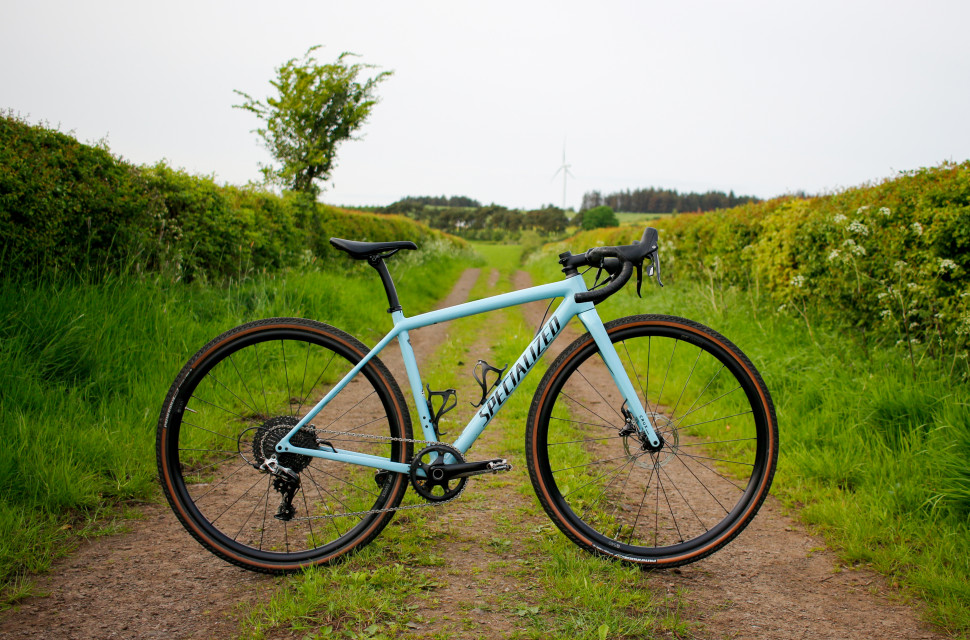
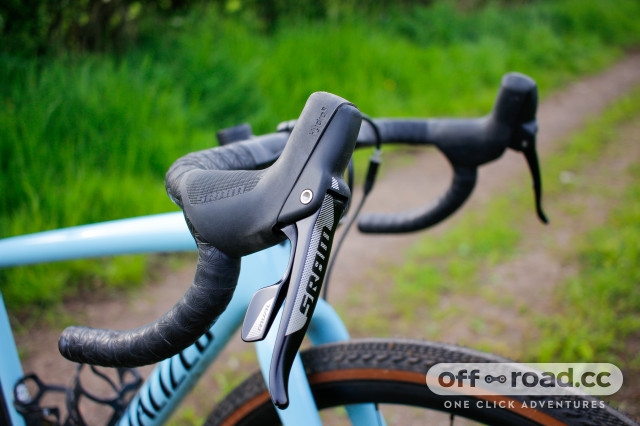

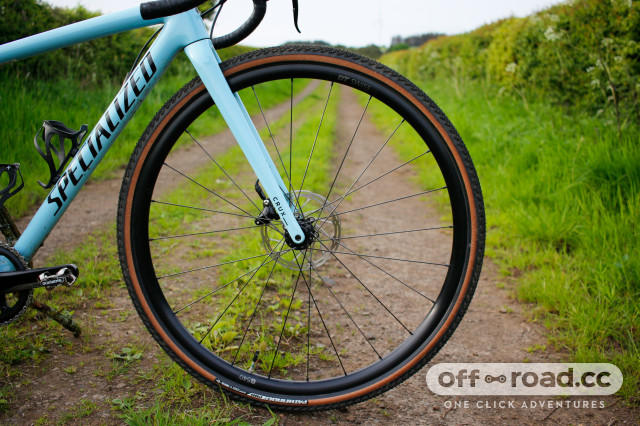
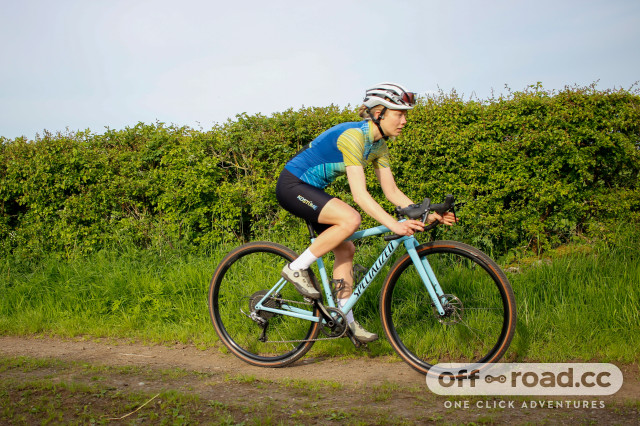


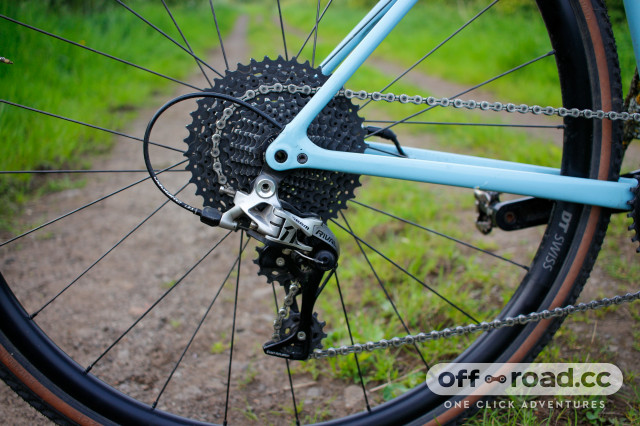
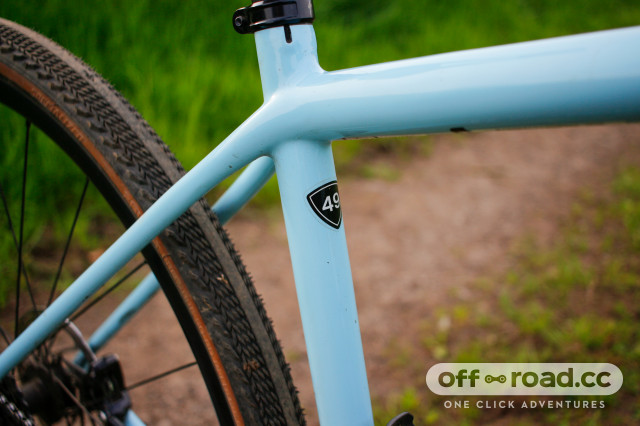


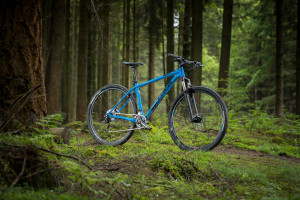









1 comments
By swapping mechanical Rival to electronical Rival you probably increase the weight.